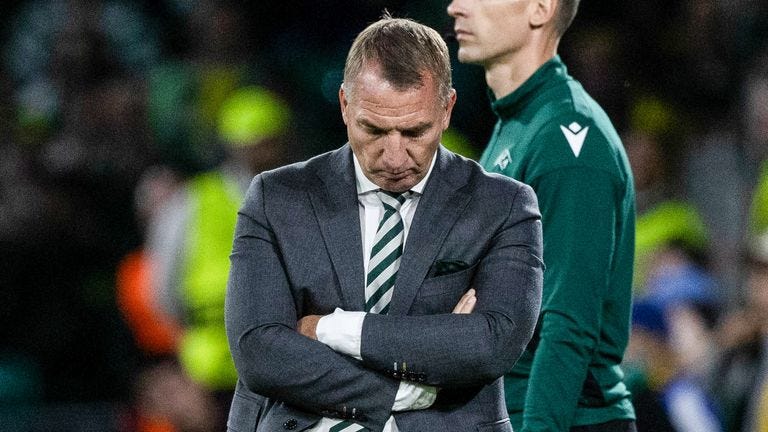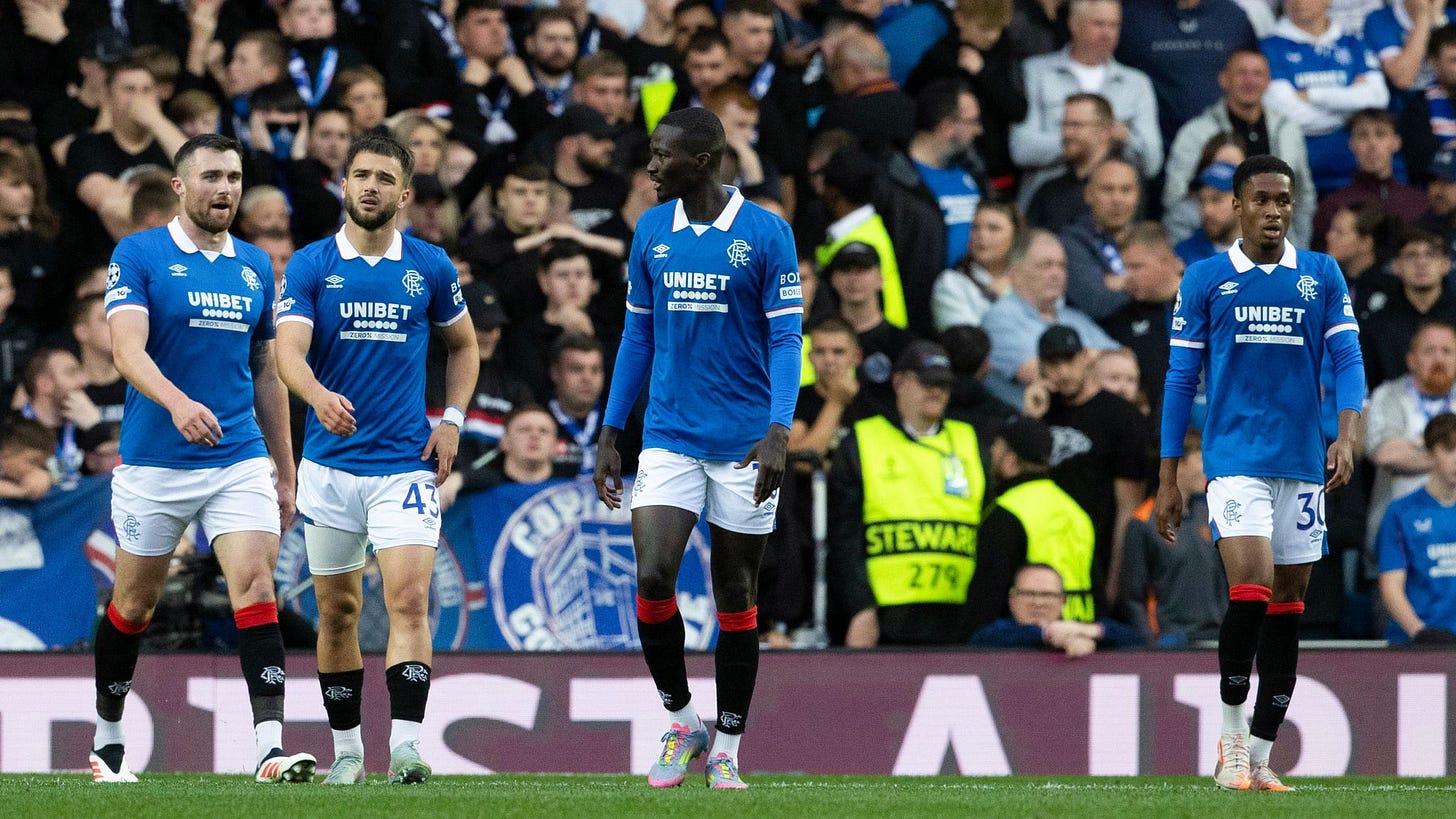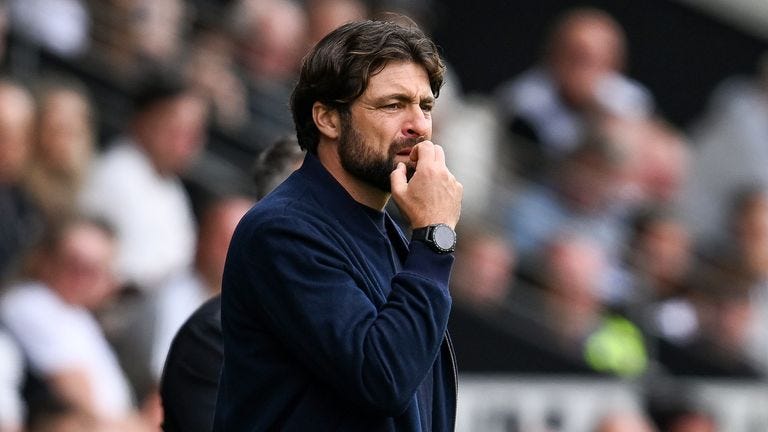Scottish Football’s European Struggles Laid Bare Once More
Celtic collapse, Rangers face a mountain in Bruges, and the wider failings of our game
It was another sobering night for Scottish football in Europe. Celtic travelled to Kazakhstan with the chance to secure a place in the Champions League proper. Instead, they return home empty handed after a goalless 210 minutes across two legs against Kairat Almaty, before stumbling out on penalties. Rangers, meanwhile, go to the Jan Breydelstadion in Bruges this evening trailing 3–1 from the first leg, with their own Champions League hopes hanging by the thinnest of threads.
The story feels painfully familiar. The passion of the fans remains undimmed, yet the reality on the pitch is a million miles from the dreams. The gulf between Scotland’s two giants and the European elite is wider than ever, and last night’s collapse only highlighted that truth once again.
Celtic’s Embarrassment
For Celtic, the defeat was more than just a bad night. It was another embarrassing chapter in a long line of European failings. Over the two legs, the Scottish champions failed to score a single goal against opponents who operate on a fraction of their budget. The first leg at Celtic Park had already rung alarm bells, the performance flat and uninspired. The second leg offered no improvement.
This disappointment comes with added sting because last season Celtic had shown real signs of progress. For the first time in years, they looked competitive in the Champions League group stage, taking points off big sides and playing with belief. Supporters had dared to think the European corner was finally being turned. Instead, one year on, they find themselves back at square one, out before the competition has even truly begun.
Brendan Rodgers has now presided over more European disappointments than he would care to admit. His record in these competitions is poor, and this tie summed up the recurring issues. Celtic dominate at home, they rack up points in the league, yet when the step up comes the creativity vanishes and the composure evaporates.
The penalty shootout summed up the evening. Adam Idah missed the first spot kick, Luke McCowan followed, and Daizen Maeda, usually a reliable finisher, saw his effort saved as well. Three misses, three blows, and Celtic were gone.
The cruel part is that they had chances in normal time to avoid such drama. Maeda’s late blast over the bar and McCowan’s strike in extra time that was well saved could have sealed the tie. Instead, the story of missed opportunities and bitter regrets repeats itself once again.
For supporters who fill the stadium every week, and for a board who talk constantly about ambition, it was not good enough. This was not Real Madrid or Bayern Munich, this was Kairat Almaty, a team stepping into the Champions League proper for the first time in their history. Celtic made them look like seasoned veterans.
Rangers’ Uphill Battle
If Celtic’s fate is sealed, Rangers are still clinging on, but the odds are stacked heavily against them. They travel to the Jan Breydelstadion in Bruges tonight, already trailing 3–1 from the first leg. The deficit is daunting, and against opponents with genuine European pedigree, the task looks almost impossible.
European football has seen miracles before, and Rangers have had their share of stirring nights, but this will require something extraordinary. A fast start, clinical finishing, and a near-perfect defensive display are the bare minimum if they are to turn this tie around.
The problem is that Rangers are heading into this match in poor domestic form. Their league campaign has already stumbled out of the blocks, with dropped points and disjointed performances fuelling frustration among supporters. In a league where Celtic rarely falter, even the slightest slip can feel catastrophic, and Rangers have looked miles off the required pace.
That has left Russell Martin under intense scrutiny only weeks into the new season. His appointment was seen as a gamble, a manager praised for his ideals but untested at this level of expectation. Already, there are murmurings that the job may be too big, that the weight of Rangers, the demands of Ibrox, and the unforgiving nature of European football are pressing down harder than he can manage.
The first leg against Bruges did little to ease those fears. Mistakes were punished, gaps were exposed, and the quality gap was evident. For a support desperate for signs of progress, it looked more like regression. Tonight in Belgium, Martin needs not just a result but a performance that convinces the doubters he has the authority and ideas to turn things around.
Financial limitations are a factor, and comparisons with bigger leagues are always made, but fans who back the club with their money and their hearts deserve better than another early exit. For Rangers, this is about pride as much as progression. They must at least show fight in Bruges, even if the mountain proves too steep to climb.
The Bigger Picture
The bigger picture is grim. Scotland’s coefficient will suffer again, and with it, the chances of automatic places in Europe. The sight of Celtic and Rangers faltering while clubs from Austria, Denmark, Switzerland, and now Kazakhstan make strides is becoming depressingly routine. These are countries with leagues of similar size and profile, yet they have found ways to adapt and progress.
The frustration is that Scotland has the fanbase. Few clubs in Europe can match the numbers that Celtic and Rangers pull through the turnstiles. The atmosphere of a European night in Glasgow should be an asset, yet too often it becomes irrelevant because of what happens on the pitch. Passion cannot cover for tactical naivety, poor recruitment, or the lack of genuine ambition from those who run the game.
There is also a cultural problem. Domestically, both clubs are too comfortable. Generally they win easily at home, they dominate their rivals, and so when the harder tests arrive there is no battle-hardened edge. Other leagues push their clubs harder week after week, forcing standards higher, whereas in Scotland a few comfortable wins can create a false sense of progress.
Where Do We Go From Here?
For Celtic, the inquest must be brutal. A Champions League place lost to a side they should have beaten will haunt Rodgers and his players for a long time. For Rangers, tonight is about survival, not just in Europe but also for Russell Martin’s credibility. If they cannot overturn their tie in Bruges, Scotland’s involvement in the Champions League will already be over before September has even arrived, and the Rangers manager will find himself under even greater pressure as fans demand answers.
More broadly, though, Scottish football needs to ask hard questions. How can clubs with such loyal followings continue to be humiliated on the continental stage? What changes in recruitment, in coaching, in ambition, are required to ensure these nights become rare rather than routine?
The fans will keep coming. They always do. But the patience wears thin when promises are broken year after year. The truth is simple: unless something changes, Scotland will remain on the outside looking in, while leagues of equal size and resource overtake us.
Conclusion
Celtic’s collapse in Kazakhstan, coming just a year after genuine progress in the Champions League, and Rangers’ daunting task in Bruges are not isolated incidents. They are symptoms of a wider malaise in Scottish football. The passion is there, the history is there, the potential is there, but the execution is missing.
European football should be a stage where our clubs shine, yet instead it has become a theatre of frustration. The question for Celtic, for Rangers, and for Scottish football as a whole is this: are we content with another year of excuses, or do we finally demand better?
By tonight, Scotland may already be out of the Champions League altogether. If Rangers cannot produce the unlikely in Belgium, this week will be remembered not only as another dark one for our game, but also as the moment Russell Martin’s tenure began to unravel.





